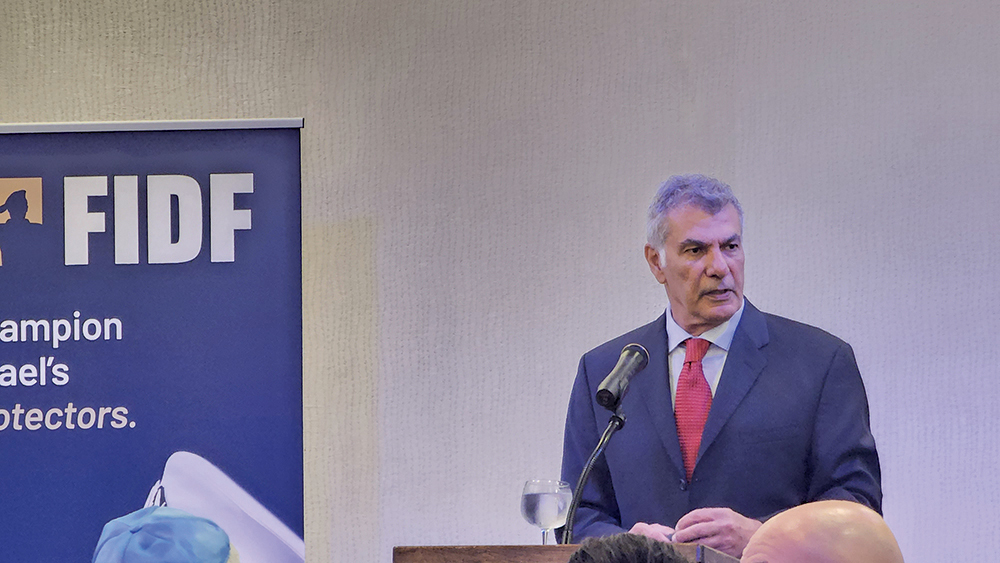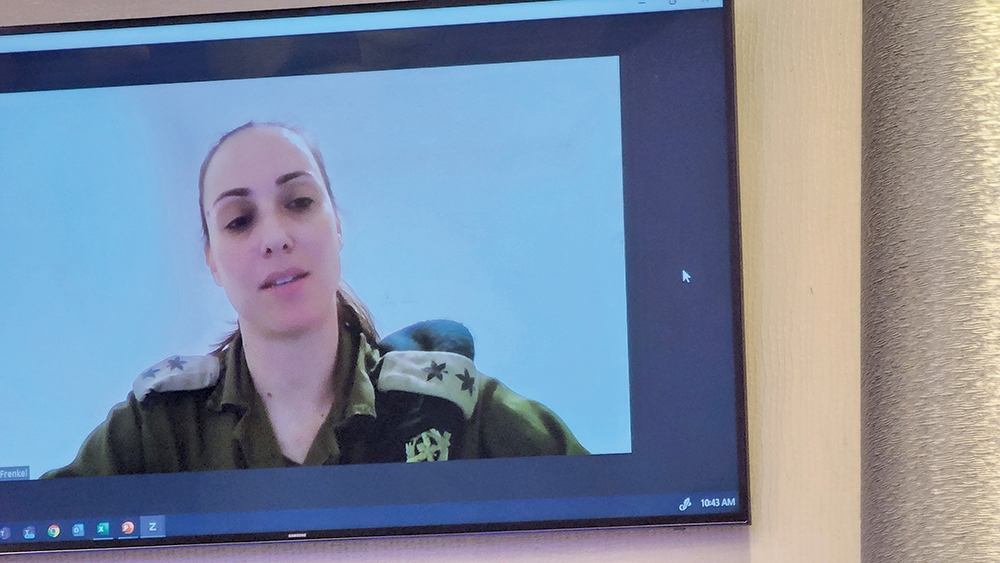
More than 100 people gathered in the banquet hall at Congregation B’nai Tikvah in North Brunswick for a ‘Morning of Solidarity’ brunch hosted by the Friends of the Israel Defense Forces (FIDF). Attendees heard a presentation by Avi Melamed outlining the history and origins of the current war and potential future global impacts.
Following the singing of Hatikvah and the Star Spangled Banner, there was a moment of silence for fallen soldiers and the thousands of victims of terror accompanied by images of a memorial Yizkor candle on large projection screens.
Howard Gases, director of the New Jersey Chapter of FIDF, thanked the audience for being there when Israel needs them the most. “We are brokenhearted, but not broken,” he said, noting that it is the job of Israeli soldiers to “look after Israel,” while it is our job in the United States to “look after them.” He added that 360,000 reservists were mobilized after the attacks on October 7.
There are many sponsorship opportunities to raise funds for needed equipment and requests from the soldiers. From candy kits to fleece blankets to siddurim, medical supplies and technical gear, the FIDF is there to meet the personal, religious and tactical needs of the soldiers. Within days, the FIDF set up fully funded field hospitals and a fully stocked medevac ambulance, provided tents for soldiers, established respite stations where soldiers could recharge, and provided lone soldier support and aid to troops wounded in battle.
Melamed, a distinguished Middle East expert and geopolitical intelligence analyst, is a former Israeli Intelligence official whose latest book, “Inside the Middle East: Entering a New Era,” builds a picture the geopolitical landscape of the region, provided a brief history of the Gaza Strip and some insight about the current war in the region.
The IDF’s goals are to eliminate Hamas and do whatever is necessary to free the remaining hostages. Despite propaganda to the contrary, Israel is conducting the most humane battle in the history of warfare. Melamed showed a map of Gaza divided into grid zones. “It is unprecedented, but Israel warns civilians and provides
notification as to which sector will be attacked and when.”
Melamed said the roots of the hostilities in Gaza are based on intra-Palestinian power struggles between the factions of Hamas and Fatah, and that the Iranian regime is funding attacks on Israel and Western powers with the goal of creating a caliphate in the entire region based on Islamic law. Most of the Arab states are Sunni Muslims who support Hezbollah, while the Iranian mullahs are Shia. Instead of fighting each other, they have formed a “marriage of convenience” to reject Western values and eliminate the State of Israel.
Iran is funding multiple proxies, such as those in Yemen and Syria, to destabilize the region, he continued. The Houthi rebels in Yemen have disrupted global shipping by attacking merchant ships in the Red Sea area. Disruption of goods and services impact countries and economies all around the world, particularly shipments of oil. Israel is fighting to contain Hezbollah in Syria, and the United States has naval ships in the Red Sea to provide stabilization in the region.

It may not be possible to totally eliminate Hamas in Gaza, Melamed stated, but it is possible to remove their military power. The next question would be how Gaza will be governed in the future. The bigger danger is the military power and financial powerhouse that is Iran and how they will shape the actions of their proxies.
Melamed took questions from the audience, including one about the impact of Russia and China in the Middle East. “Both countries were far to the left initially and supporters of Hamas. In the course of time, China has moved closer to the center. Russia has moved less, but they are seeing the attention moving away from their attack on Ukraine.”
A special Zoom was set up with Lieutenant Colonel Michal Frenkel in Israel, who briefly discussed the current situation, casualty rates, and appreciation for the help of the American community.
Bette Epstein came to the event from Highland Park with her husband, Edward. “I received an email from FIDF shortly after October 7 and donated money to help. I rely on their email news updates because it is hard to find accurate news about what is going on in Israel from the mainstream media.”
Brian Katz of Edison describes himself as a “strong supporter of the IDF and Israel.” He said, “It shouldn’t take a war to get us together in this kind of number, but it is important to support Israel as much as you can.” Yehuda and Jennine Shpigel came from Monroe to show their support. Yehuda is from Israel and has family there.
Rabbi Robert Wolkoff of B’nai Tikvah said that supporting Israel and the IDF is one of the most important things we can do as a community. “We did not have our own country for 2,000 years; it is a privilege to provide the support after all we went through. The army risks their lives for us in combat and going through the infamous tunnels in Gaza. All we have to do is write a check.”
Gases said that while FIDF has held similar brunches annually, this one was the most highly attended due to the events of October 7. Donations are still needed and can be made at https://www.fidf.org/













